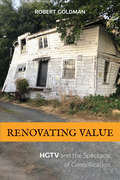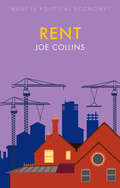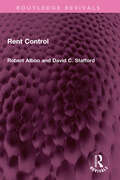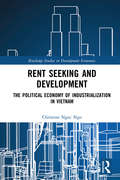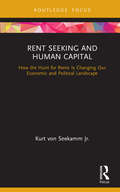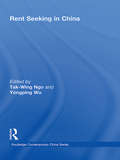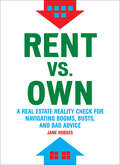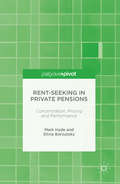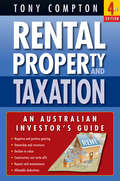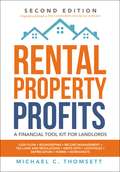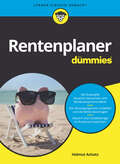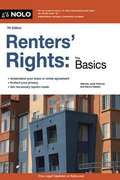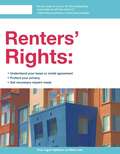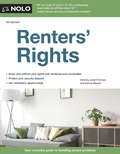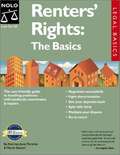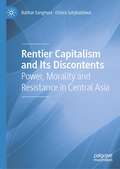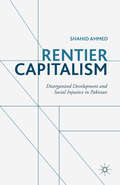- Table View
- List View
Renold Chains: A History of the Company and the Rise of the Precision Chain Industry 1879-1955
by Basil TrippFirst Published in 2005. Routledge is an imprint of Taylor & Francis, an informa company.
Renovating Healthcare IT: Building the Foundation for Digital Transformation
by Susan SnedakerHealthcare IT is under tremendous pressure in today’s environment: Budgets are shrinking; staff are in short supply; cloud, mobile, and data are driving expansion and innovation. Consumer expectations are high while agility and speed to market for many HIT organizations is low. The exponential growth of data sources and the need to empower healthcare with data-driven intelligence is pushing capabilities. The words "digital transformation" are infused in just about every discussion and serve to amplify organizational expectations of IT. In this environment, IT departments have to retool, rethink, and revise their way of operating. Few have the option of starting from scratch; the vast majority of organizations have built IT functions over decades. Now, it’s time to remodel and renovate for the future. This book walks the reader through the process of determining what type of IT function they have today and what they’ll need tomorrow. It discusses how to assess and analyze IT capabilities and then develop and implement a plan to renovate in place. By retooling now, the IT function can successfully meet the growing demands of the organization in the future. When approached in a planful manner, this process of renovating can energize the entire organization and help foster innovation and transformation along the way.
Renovating Value: HGTV and the Spectacle of Gentrification
by Robert GoldmanHGTV has perfected stories about creating and capturing value in the housing market. But according to Robert Goldman, this lifestyle network’s beloved flagship programs, Flip or Flop, Property Brothers, and Fixer Upper—where people revitalize modern spaces and reinvent property values—offer “fairy tales” in the wake of the 2008 economic crisis. The cable channel’s seductive, bingeable programs may show how to find and extract value from properties, but, in fact, they insidiously ignore the realities of the real estate and mortgage markets, housing inequality, gentrification, economic insecurity, and even homelessness. In effect, HGTV has turned house flipping into a master narrative about getting ahead in America during an era of otherwise uneasy economic prospects. HGTV pictures its insular moral economy as an alternative to a crisis-ridden neoliberal finance system that shaped landscapes of foreclosure and financial uncertainty for millions of households. Renovating Value explores the circuitry of consumer credit and debt, and a rent-gap model of gentrification that charts a path to the rehabilitation of Value. Goldman shrewdly critiques the aspirational myth of adding value to a home simply by using imagination, elbow grease, and aesthetic know-how.
Rent (What is Political Economy?)
by Joe CollinsThe problem of rent is at the root of vital social concerns in the twenty-first century, ranging from the climate emergency and spiralling economic inequality to the repercussions of global economic crises. But while many of us may be familiar with rent (especially paying it), how should we really understand it? Examining both concrete contexts and complex concepts, in this book Joe Collins provides a comprehensive but concise survey of the theories and debates over rent and rentier capitalism. He examines global gentrification from São Paolo to Dublin, the tyranny of technology from Taipei to San Francisco, and the excesses of extractivism from Sekondi to Karratha. In doing so, he reveals how rent is fundamental to the current dominant form of capitalist social organization across the globe and how we can prevent the next generation from seeing our societies rent asunder. An essential resource for students and scholars alike, this groundbreaking book will be of interest to anyone working on capitalism, property, political economy, economic sociology and contemporary politics.
Rent Control (Routledge Revivals)
by Robert Albon David C. StaffordFirst Published in 1987, Rent Control discusses the economics of rent control, citing numerous international examples of the detrimental effects of rigid rent control. Various policy options to revamp rental housing markets are examined critically. Rent control has proved a key issue in both politics and economics, repeatedly dividing interventionists and free marketeers. Consequently, its history - throughout the world- is extremely involved and tangled. Successive governments have sought to reverse the legislation of their predecessors without appearing, on the one hand, to remove the right to manage their own properties from landlords, or on the other to condone the behavior of unscrupulous and exploitative landlords. The authors argue that partial repeals of rent control have been ineffective at best, and counterproductive at worst. Only complete abolition of rent and eviction controls imposed by the state can bring about revitalised housing markets, and the book ends with a discussion of how this can be done without causing too much hardship. This is an interesting read for scholars and researchers of political economy and British economy
Rent Seeking and Development: The Political Economy of Industrialization in Vietnam. (Routledge Studies in Development Economics)
by Christine Ngoc NgoRent seeking continues to be a topic of much discussion and debate within the political economy. This new study challenges previous assumptions and sets out a new analysis of the dynamics of rent and rent seeking in development, using Vietnam as a case study. This book provides an alternative approach to the study of economic development and illuminates new perspectives in a contemporary context. It argues that not only has there been an incomplete understanding of Vietnam’s industrial development over the last three decades, but that neoclassical economics do not adequately address many of the issues endangering Vietnam’s development. A significant observation of the Vietnamese experience is the analytical view that rents can be developmental and growth enhancing if the configuration of rent management incentivizes industrial upgrade and conditions firm performance. Underlining the need to reexamine how economic actors and the state collaborate through formal and informal institutions, this study fills a gap in the scholarship of the political economy of rent and rent seeking and how rents might be used for developmental purposes.
Rent Seeking and Human Capital: How the Hunt for Rents Is Changing Our Economic and Political Landscape (Routledge Frontiers of Political Economy)
by Kurt von Seekamm Jr.Rent Seeking and Human Capital: How the Hunt for Rents Is Changing Our Economic and Political Landscape explores the debates around rent seeking and contextualizes it within the capitalist economy. It is vital that the field of economics does a better job of analyzing and making policy recommendations that reduce the opportunities and rewards for rent seeking, generating returns from the redistribution of wealth rather than wealth creation. This short and provocative book addresses the key questions: Who are the rent seekers? What do they do? Where do they come from? What are the consequences of rent seeking for the broader economy? And, finally: What should policymakers do about them? The chapters examine the existing literature on rent seeking, including looking at the differences between rent seeking and economic rent. The work provides an in-depth look at the case of the impact of rent seeking degrees in the United States, particularly in business and law, and explores potential policy remedies, such as a wealth tax, changes to the rules on financial transactions, and patent law reform. This text provides an important intervention on rent seeking for students and scholars of heterodox economics, political economy, inequality, and anyone interested in the shape of the modern capitalist economy.
Rent Seeking in China (Routledge Contemporary China Series)
by Tak-Wing Ngo Yongping WuIn China, rent seeking has been linked to the idea of the local developmental state in which rapid economic development is explained in terms of the promotion of village and township enterprises by local cadres who wants to maximize revenue. At the same time, the rent-seeking state is also seen as the root of corrupt practices and in the creation of a political market where state assets and authorities are diverted into private interests. Despite the prevalence of rent seeking practices in present day China, no systematic study of the phenomenon across different regions and economic sectors has yet been undertaken and as such what accounts for the occurrence of the phenomenon, what range of activities are related to rent seeking practices and, more importantly, how rent seeking shapes political and economic development are barely understood. Rent Seeking in China seeks to address these questions using case studies from across economics sectors including primary industry, strategic industry, heavy industry, and light industry. It will be invaluable reading for students and scholars of Chinese politics, comparative politics and Chinese economic and business management.
Rent the Runway (Abridged)
by Thomas R. Eisenmann David A. Kirsch Brent GoldfarbTwo months after a successful launch In November 2009, the cofounders of Rent the Runway (RTR), a website that rented designer dresses, are debating whether to grow their startup at a measured pace and focus on improving operational effectiveness, or raise a new round of venture capital sooner than originally planned. Raising more venture capital would allow RTR to aggressively expand its inventory and customer acquisition efforts, in order serve a broader range of customer segments with a wider selection of products, (e.g., accessories, maternity wear).
Rent vs. Own: A Real Estate Reality Check for Navigating Booms, Busts, and Bad Advice
by Jane HodgesThis guide to making the big decision by a real estate reporter is “a truly balanced look at an emotional subject . . . plenty of tips to keep you above water” (Mint.com).When it comes to real estate, renting vs. owning is always a big decision—not just whether to take the plunge, but when. The housing market can be volatile, and purchasing a home may be one of the biggest investment decisions you’ll ever make.This guide offers a reality check that cuts through all the hype and helps you decide whether to buy now or keep renting. Expert finance and real estate reporter Jane Hodges, who has written for the Wall Street Journal, Seattle Times, and other top publications, explains how the housing market works and breaks down all the pros and cons of buying and renting—because contrary to popular belief, buying isn’t the best choice in every situation. With dozens of success stories and cautionary tales from real-life renters and owners across the country, this indispensable manual gives confused consumers the tools to make the right decision for their budget, market, personal needs, and future.
Rent-Seeking in Private Pensions
by Mark Hyde Silvia BorzutzkyThis bookargues that the implementation of compulsory, highly regulated, privatelyadministered, defined contribution pensions facilitates rent-seeking behaviouron the part of the pension fund administrators and undermines the retirees'income and well-being. While the book focuses primarily on Chile, its analysisand conclusions are applicable to several Latin American and Eastern Europeancountries where privately administered pension systems have been implemented. Chapters evaluate the scholarly literatureand empirical evidence around three aspects of the pension fund industry:structure, pricing and performance. The authors conclude that state regulationhas facilitated the accumulation of capital in the hands of the pension fundadministrators. They also demonstrate that these systems owe more to the valuesand principles of conservative philosophy than to neoliberalism in providingalternative solutions to the rent-seeking approach to retirement.
Rent-Way, Inc. (A)
by David F. HawkinsThe company uses the units of activity method to account for its rental inventory. A prominent hedge fund advisor recommends the company's stock be sold short.
Rental Person Who Does Nothing: A Memoir
by Shoji Morimoto***Now an International Bestseller!***"Distinctively Japanese musings on meaning and connection."—ObserverI'm starting a service... available for any situation in which all you want is a person to be there. Maybe there's a restaurant you want to go to, but you feel awkward going on your own.Maybe a game you want to play, but you're one person short.Or perhaps you'd like someone to keep a space in the park for your cherry blossom viewing party...Shoji Morimoto was constantly being told by his boss, "It makes no difference whether you&’re here or not," and that his presence contributed nothing to the company. Morimoto began to wonder whether a person who "does nothing" could still have actual value and a place in the world. Perhaps he could turn "doing nothing" into a service? With one tweet, Rental Person was born.Rental Person provides a fascinating service to the lonely and socially anxious. This book details thousands of his true-life adventures: Accompanying a divorcee to her favorite restaurant Waving goodbye to a client from the train platform Sitting in the courtroom during a client&’s trial Supporting a client during a difficult surgeryRental Person is dependable, nonjudgmental and committed to remaining a stranger, and the curious encounters he shares are revelatory about both Japanese society and human psychology.In Rental Person Who Does Nothing, Morimoto chronicles his extraordinary experiences in his unique line of work and reflects on how we consider relationships, jobs and family in our search for meaningful connection and purpose in life.
Rental Property and Taxation: An Australian Investor's Guide
by Tony ComptonDon't leave the success of your investment up to a visit to your accountant once a year -- this book could save you hundreds! In print for over 10 years, Rental Property and Taxation debunks the many myths surrounding tax and real estate investment, and takes an objective look at how a loss from a rental property can affect your tax situation. In this fully updated fourth edition, practising accountant Tony Compton arms rental property owners and would-be owners with the information they need to be better informed about tax as it relates to their own circumstances. It covers all aspects of rental property ownership, including: allowable deductions decline in value and construction cost write-offs negative and positive gearing record keeping structures and ownership, and more! With its plain-English explanations, real-life case studies and the latest updates to tax laws, Rental Property and Taxation will take the 'buy now and hope for the best' factor out of tax planning for rental property investments.
Rental-Property Profits: A Financial Tool Kit for Landlords
by Michael ThomsettThis book walks you through every important step, from spotting smart investments to taking advantage of tax breaks and loopholes.With rental prices climbing, vacancy rates low, and property values rising, real estate investing has become a tempting option for achieving financial security. The fixer upper shows today that make it look so easy—simply buy a property, fix it up, and then rent it until you&’re ready to sell for a profit—has the number of real estate investors is growing, but the same can&’t be said for all their bank accounts. The reality is that real estate can be confusing, requiring in-depth financial and tax knowledge that most newcomers lackWith clear language and updated forms, worksheets, checklists, and formulas, Rental-Property Profits explains how to:Evaluate risks and opportunities in a post-recession marketDetermine if you qualify for an investor loaCalculate cash flow and maintain healthy levelsEstablish sound bookkeeping and accounting systemsHandle rental property depreciationReal estate investing is not as easy as it looks on TV, but it also doesn&’t have to be risky. With this self-guided manual by your side, avoid the costly mistakes that many before you didn&’t see coming, and build the nest egg you deserve!
Rentenplaner für Dummies (Für Dummies)
by Helmut AchatzKurz vor der Rente ? und nun? Spätestens jetzt fragen Sie sich, ob Ihre Rente reicht und was auf Sie zukommt. Helmut Achatz erklärt, worauf Sie achten müssen und was Sie noch kurz vor Rentenbeginn erledigen sollten. Er hilft Ihnen, einen Überblick über Ihre Finanzen im Alter zu gewinnen. Sie erfahren, wie Sie früher in Rente gehen können, wie Sie Ihre Rente aufbessern können und welche Fallstricke es bei Steuern und Sozialabgaben gibt. Sie erhalten außerdem Anregungen, wie Sie Ihr Vermögen im Alter am besten anlegen, wo Sie sparen können und worauf es beim Vererben ankommt ? um so entspannt der Rente entgegenzusehen.
Renters' Rights
by Janet Portman AttorneyAimed at everyone from the new renter on the block to more seasoned tenants who just want to know the basics, this primer is packed with the critical legal and practical information that every renter needs, written in plain English. Renters' Rights covers important concerns like: . leases and rental agreements . discrimination . rent . security deposits . privacy . roommates . repairs and maintenance Co-authored by two experts in tenants' rights, this book is as indispensable as a friend with a pickup truck and a free weekend. This edition is completely updated to reflect changes to your state's laws, including new information on what to do if your rental goes into foreclosure and increased legal protections for domestic violence victims.
Renters' Rights
by Marcia Stewart Janet Portman AttorneyRenter? Head off problems with roommates and landlords! Is your roommate making it next to impossible to pay the rent on time each month? Or is your landlord forgetting about the clogged drain he said he'd repair weeks ago? Then it's time to assert your rights! Aimed at everyone from the new renter on the block to more seasoned tenants who just want to know the basics, this primer is packed with the critical legal and practical information that every renter needs, written in plain English. Renters' Rights covers important concerns like: leases and rental agreements discrimination rent security deposits privacy roommates repairs and maintenance Co-authored by two experts in tenants' rights, this book is as indispensable as a friend with a pickup truck and a free weekend. This edition is completely updated to reflect changes to your state's laws, including new information on what to do if your rental goes into foreclosure and increased legal protections for domestic violence victims. This book contains many 50-state charts such as security deposit limits and state laws in domestic violence situations, that give tenants the exact information they need.
Renters' Rights: The Basics
by Janet Portman Marcia StewartHandle problems with landlords and roommates! The landlord ignores your repair requests. Your roommate is always late with his share of the rent. Your upstairs neighbors party all the time. The landlord won't return your security deposit. How can you deal with these problems--and others--and prevent them from happening again? Turn to Renters' Rights: The Basics for answers! Written in plain English, this fully updated bestseller covers: leases and rental agreements credit reports and references roommates sublets and short-term vacation rentals privacy discrimination and retaliation security deposits repairs and maintenance getting out of a lease, and and more. This 9th edition, featuring easy-to-use summaries of each state's laws, is completely updated and revised to reflect the key landlord-tenant laws of your state.
Renters' Rights: The Basics (3rd edition)
by Janet Portman Marcia StewartRenters fed up with difficult roommates, absent landlords and thoughtless neighbors have a new place to turn. This Legal Basics book, bursting with legal and practical advice, covers tenants' rights in all 50 states.
Renters’ Rights: The Basics (3rd edition)
by Janet Portman Marcia StewartRenters fed up with difficult roommates, absent landlords and thoughtless neighbors have a new place to turn. This Legal Basics book, bursting with legal and practical advice, covers tenants' rights in all 50 states.
Rentier Capitalism and Its Discontents: Power, Morality and Resistance in Central Asia
by Balihar Sanghera Elmira SatybaldievaThis book explains and evaluates today’s economic, political, social and ecological crises through the lens of rentier capitalism and countermovements in Central Asia. Over the last three decades the rich and powerful have increased their wealth and political power to the detriment of social and environmental well-being. But their activities have not gone unchecked. Grassroots activism has resisted the harmful and damaging effects of the neoliberal commodification of things. Providing a much-needed theorisation of the moral economy and politics of rent, this book offers in-depth case studies on finance, real estate and natural resources in Kazakhstan and Kyrgyzstan. The authors show the mechanisms of rent extraction, their moral justifications and legitimacy, and social struggles against them. This book highlights the importance of class relations, state-countermovement interactions and global capitalism in understanding social and economic dynamics in Central Asia. It will be relevant to students and researchers interested in political economy, development studies, sociology, politics and international relations.
Rentier Capitalism: Disorganised Development and Social Injustice in Pakistan
by S. AhmedSince the early 1950s East Asia (China, Taiwan and South Korea) and South-East Asia (Indonesia, Malaysia, Thailand and Vietnam) have, despite war and other challenges, managed to transform the lives of their people, whereas South Asia (India, Pakistan, Bangladesh and Sri Lanka) has lagged behind. The success of East and South-East Asia has not been accidental – it has been driven by action to reduce rural poverty, by the provision of decent education and health services to the people, and by high quality physical and institutional infrastructure, such as roads, ports and railways, and targeted support from the State to develop particular industries. In contrast, Pakistan has never confronted the problem of rural poverty, nor invested in public services. This failure is a reflection of the power of the landed class and its urban allies. This has now taken the form of widespread rent-seeking in the economy with the country's ruling elite sharing out the spoils amongst themselves rather than taking measures to grow the size of the economy so that all might share in the resulting prosperity.Rentier Capitalism sheds light on the reasons behind Pakistan's failure to bring prosperity to its people when compared to other East Asian and South-East Asian countries.


